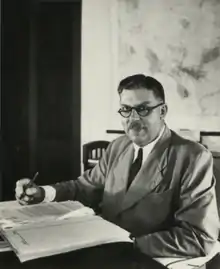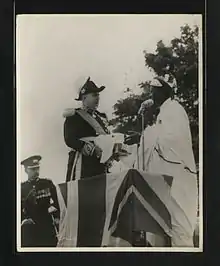Edward Twining
Edward Francis Twining, Baron Twining GCMG MBE KStJ (29 June 1899 – 21 June 1967), known as Sir Edward Twining from 1949 to 1958, was a British diplomat, formerly Governor of North Borneo[1] and Governor of Tanganyika. He was a member of the Twining tea family. In 1960 he published a book titled A History of the Crown Jewels of Europe; at over 700 pages it is probably the most extensive book on the subject.
The Lord Twining GCMG MBE KStJ | |
|---|---|
 | |
| Governor of Tanganyika | |
| In office 1949–1958 | |
| Monarch | George VI Elizabeth II |
| Preceded by | Sir William Battershill |
| Succeeded by | Sir Richard Turnbull |
| Governor of North Borneo | |
| In office 1946–1949 | |
| Monarch | George VI |
| Preceded by | Robert Smith |
| Succeeded by | Sir Ralph Hone |
| Personal details | |
| Born | Edward Francis Twining 29 June 1899 Westminster, England |
| Died | 21 July 1967 (aged 68) Westminster, England |
| Nationality | British |
| Occupation | Diplomat, colonial governor |
Early and personal life
Twining was born in 1899 in Westminster to William Henry Greaves Twining, vicar of St Stephen's, Rochester Row, London and his wife, Agatha Georgina, fourth daughter of Lieutenant-Colonel Robert Bourne. His brother Stephan Twining became the managing director of the tea merchants, Twinings. He was a Provost scholar to Lancing before training at the Royal Military College, Sandhurst.
He married Helen Mary, daughter of Arthur Edmund Du Buisson, in 1928 and they had two sons.
British Army service

He served in Dublin with the Worcestershire Regiment between 1919 and 1922, inadvertently capturing Éamon de Valera in 1921. He was appointed MBE[2] for his services in Ireland. He then entered the colonial administrative service following two tours of Uganda with the 4th King's African Rifles, returning there in 1929 as an assistant district commissioner. He moved to Mauritius as director of labour in 1939, before becoming administrator in St Lucia in 1943; he was appointed Companion of the Order of St Michael and St George in the same year.[3]
Colonial service: Imperial governor
Twining served as Governor of North Borneo from 2 December 1946.[4] In 1949 he was promoted to KCMG[5] and became Governor of Tanganyika on 16 May,[6] serving there until 1958. He was promoted to GCMG in 1953.[7] This was prompted largely because, as a governor of a colony under the auspices of United Nations supervision, he was more than happy to receive Inspectors to the east African country on biennial missions. In 1952 he had already paved the way for independence in 1961 by trialling an all-communities constitutional arrangement that guaranteed democratic representation for minority populations in the state that would become Tanzania.
House of Lords
Following his retirement, he became a life peer as Baron Twining, of Tanganyika and of Godalming in the County of Surrey, on 22 August 1958.[8] Lord Twining made his maiden speech on 27 July 1959 during the debate on the Colonial Development Corporation. Colonial governors had always had difficulty developing East African countries, given the huge distances between scattered populations, and the tendency of African politics to fragment into tribal loyalties. However, back in London he encouraged development corporations to work closely with governments and business to secure more investment in African territories. Describing himself as a "paternal governor", he called for better organized schemes because they were "rather haphazard". He warned that the Westminster model should not be imposed upon Africa, rather that the local leaders should be allowed to draft their own party political arrangements to articulate independence movements. Like most Liberal-leaning politicians, he was sympathetic to self-determination, largely because it stimulated progress or debate on the progress of institutional development towards the principles of freedom.[9] After independence, the African states suffered large-scale migration; hundreds of thousands of displaced persons became stateless. Twining was among those peers who asked the Commonwealth Office to donate more money to alleviate the world refugee crisis.[10]
Twining was among those peers who opposed the second reading of the Misrepresentation Bill, a flagship piece of fraud legislation for the Wilson Government.
Other honours
He was appointed a Knight of the Venerable Order of Saint John in 1950.[11] He also served as Honorary Colonel to 6th Battalion King's African Rifles from 1955 to 1958.[12]
  |
|
Publications
- A History of the Crown Jewels of Europe. London: B. T. Batsford, 1960.
- European Regalia. London: B. T. Batsford, 1967.
References
- http://www.rulers.org/malstat.html
- "No. 32782". The London Gazette (Supplement). 1 January 1923. pp. 7–8.
- "No. 36033". The London Gazette (Supplement). 2 June 1943. p. 2421.
- "No. 37816". The London Gazette. 13 December 1946. p. 6072.
- "No. 38493". The London Gazette (Supplement). 1 January 1949. p. 4.
- "No. 38621". The London Gazette. 27 May 1949. p. 2617.
- "No. 39732". The London Gazette (Supplement). 1 January 1953. p. 5.
- "No. 41479". The London Gazette. 22 August 1958. p. 5211.
- HL Hansard, 16 November 1961, cols 743-5.
- "The World Refugee Problem", HL Deb 20 October 1966 vol 277 cc124-84.
- "No. 38952". The London Gazette. 23 June 1950. pp. 3258–3259.
- "Twining, Baron". Who Was Who. A & C Black; Oxford University Press. December 2007. Retrieved 12 December 2010.
- Burke's Peerage. 1959.
- Fletcher-Cooke, John; Pratt, Cranford (January 2008). "Twining, Edward Francis, Baron Twining (1899–1967)". Oxford Dictionary of National Biography. Oxford University Press. doi:10.1093/ref:odnb/36598. (subscription or UK public library membership required)
External links
- Hansard 1803–2005: contributions in Parliament by Mr Francis Twining
| Government offices | ||
|---|---|---|
| Preceded by Robert Smith |
Governor of North Borneo 1946–1949 |
Succeeded by Sir Ralph Hone |
| Preceded by Sir William Battershill |
Governor of Tanganyika 1949–1958 |
Succeeded by Sir Richard Turnbull |
